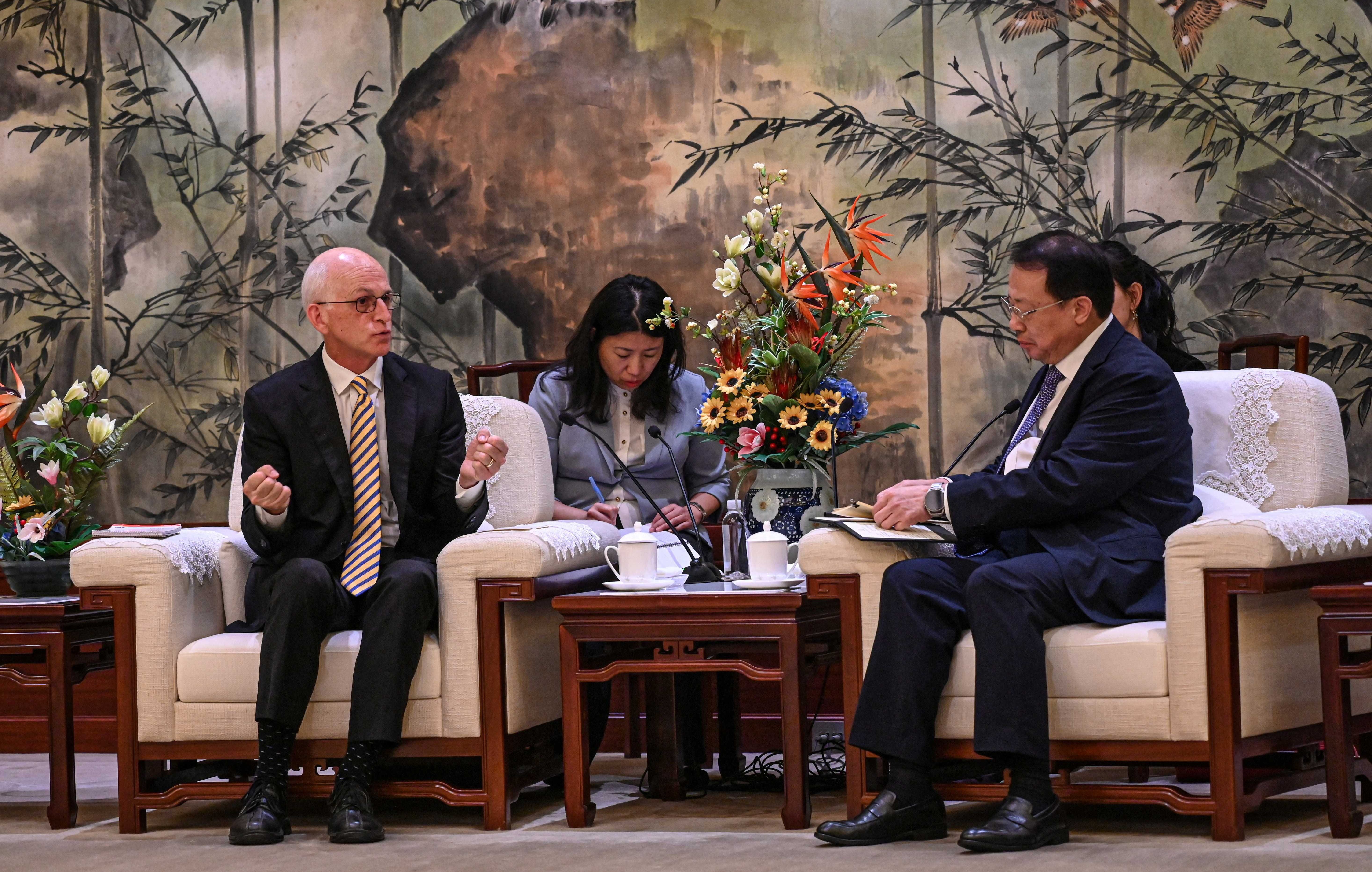In the midst of the U.S. government shutdown and controversy over military deployments in American cities, partisanship in Congress sometimes seems out of control. But legislators of both parties can still set aside their animosities when it comes to hyping conflict with China.
On Monday, Senate Foreign Relations Committee Chair Jim Risch introduced his Deter PRC Aggression Against Taiwan Act. On Tuesday, the House Select Committee on China issued a bipartisan report pressing to tighten the U.S. embargo against China on advanced semiconductors. On Wednesday, the Senate Committee on Aging highlighted “the terrifying reality” that, on generic pharmaceuticals, “our nation is completely beholden to Communist China.”
But the bipartisan China panic might finally be facing pushback — not from partisan passions but from a nascent bipartisan coalition that has long feared confrontation with the world’s other superpower but up to now was cowed into silence.
Rep. Adam Smith’s (D-Wash.) recent congressional delegation to China is illustrative of the potential. Joined by Reps. Ro Khanna (D-Calif.), Chrissy Houlahan (D-Pa.), and Michael Baumgartner (R-Wash.), this was the first visit by members of the House of Representatives since 2019.
Congressional delegations to China used to be routine. In the 2010s, an average of nearly six delegations made the trip each year, with members participating well over 200 times that decade. Though China’s post-Covid re-opening is now almost three years long, only one Senate delegation made the trip, along with a single-member visit by Sen. Steve Daines (R-Mont.).
This sharp decline is driven by Washington’s growing hostility and fear toward China in recent years. China’s “malign influence” and “economic aggression” became prominent themes in congressional hearings. Conspiracy theories about the Chinese government orchestrating the fentanyl crisis, the Covid pandemic, or TikTok’s political content flourished. The House Oversight Committee’s view that the Communist Party “actively seeks to destroy America” was widely shared.
Just as important, animosity toward China emerged as a rare point of agreement between Democrats and Republicans, leading legislators and lobbyists to reach for even tenuous connections to China in order to marshal support for their causes. Worried about U.S. business offshoring jobs? Attack China. Worried about the effects of social media? Attack China. Worried about teenagers vaping? Attack China. The outcome was an avalanche of antagonistic legislation.
If members of Congress saw China hostility as an opportunity, they also viewed constructive policy as a threat to their careers. Claims that a candidate might be spying for China or helping it steal American jobs were common in 2024 campaign attack ads. Although polling showed overwhelming popular support for diplomacy with China and deep concerns about the possibility of conflict, pervasive anti-China sentiment in Washington blinded politicians to the advantages of a more moderate stance.
Even at the height of China panic, however, a handful in Congress warned that turning China into our enemy is a disaster in the making. In 2023, Smith condemned the idea that we need to “punch [adversaries] in the face repeatedly at every opportunity and that’s what’s going to help us. … [A]ll this overheated rhetoric about how you can’t even talk to China because that just shows you are weak is really troubling.”
Such independent thinking may have an opening thanks to President Trump’s enthusiasm for dealmaking. After the U.S. and China demonstrated their respective leverage in an exchange of economic attacks earlier this year, substantive negotiations are now under way for the first time since Trump’s first-term trade war. An agreement on TikTok ownership could open the way to more serious efforts.
The Chinese response to the Smith delegation shows that Trump has a receptive partner in Beijing. Premier Li Qiang, meeting with the delegation, called it an “icebreaking trip that will further ties between the two countries.” Even nationalist outlets expressed hopes that “this window might open wider and wider.”
Trump officials will be doing the direct negotiating, but members of Congress have two essential roles to play. First, they can reinforce the new atmosphere of openness by pushing back against continued attempts to discredit diplomacy. Even as the Smith delegation was speaking of U.S.–China communication and reciprocity, their colleagues on both sides of the aisle were vilifying China, comparing Xi Jinping to Hitler and claiming that China’s “ultimate goal is to see America divided and weakened.”
Second, members of Congress can press the administration toward a more careful and constructive set of agreements. Trump’s personal priorities are landing Chinese orders for Boeing airplanes and Midwest soybeans, goals that could benefit both sides in the short term but will not change the overall trajectory toward conflict.
For that, the United States and China will need a new foundation for healthy competition. In line with Trump’s interests, one key measure would be a framework for Chinese investment in the United States ensuring security to both sides. Another priority is something Smith highlighted in Shanghai: renegotiating the rules of the global economy to accommodate countries like China, India, and Brazil without sacrificing American interests. With few detailed proposals coming out of the administration, members of Congress have a valuable opportunity to shape this new phase of U.S. relations with China.
- Top House Dem blasts 'nothing about Ukraine without Ukraine' approach ›
- Top House Dem: Party's embrace of hawks 'is a problem' ›
















